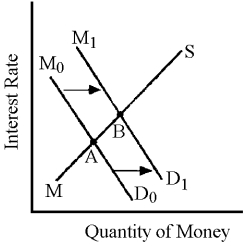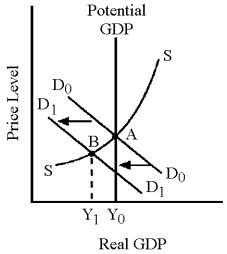Exam 33: Budget Deficits in the Short and Long Run
Exam 1: What Is Economics?227 Questions
Exam 2: The Economy: Myth and Reality150 Questions
Exam 3: The Fundamental Economic Problem: Scarcity and Choice250 Questions
Exam 4: Supply and Demand: An Initial Look308 Questions
Exam 5: Consumer Choice: Individual and Market Demand202 Questions
Exam 6: Demand and Elasticity209 Questions
Exam 7: Production, Inputs, and Cost: Building Blocks for Supply Analysis216 Questions
Exam 8: Output, Price, and Profit: The Importance of Marginal Analysis189 Questions
Exam 9: Securities: Business Finance, and the Economy: The Tail that Wags the Dog?198 Questions
Exam 10: The Firm and the Industry under Perfect Competition208 Questions
Exam 11: Monopoly203 Questions
Exam 12: Between Competition and Monopoly225 Questions
Exam 13: Limiting Market Power: Regulation and Antitrust152 Questions
Exam 14: The Case for Free Markets I: The Price System220 Questions
Exam 15: The Shortcomings of Free Markets212 Questions
Exam 16: The Market's Prime Achievement: Innovation and Growth110 Questions
Exam 17: Externalities, the Environment, and Natural Resources217 Questions
Exam 18: Taxation and Resource Allocation219 Questions
Exam 19: Pricing the Factors of Production228 Questions
Exam 20: Labor and Entrepreneurship: The Human Inputs223 Questions
Exam 21: Poverty, Inequality, and Discrimination167 Questions
Exam 22: An Introduction to Macroeconomics211 Questions
Exam 23: The Goals of Macroeconomic Policy207 Questions
Exam 24: Economic Growth: Theory and Policy223 Questions
Exam 25: Aggregate Demand and the Powerful Consumer214 Questions
Exam 26: Demand-Side Equilibrium: Unemployment or Inflation?210 Questions
Exam 27: Bringing in the Supply Side: Unemployment and Inflation?223 Questions
Exam 28: Managing Aggregate Demand: Fiscal Policy205 Questions
Exam 29: Money and the Banking System219 Questions
Exam 30: Monetary Policy: Conventional and Unconventional205 Questions
Exam 31: The Financial Crisis and the Great Recession61 Questions
Exam 32: The Debate over Monetary and Fiscal Policy214 Questions
Exam 33: Budget Deficits in the Short and Long Run210 Questions
Exam 34: The Trade-Off between Inflation and Unemployment214 Questions
Exam 35: International Trade and Comparative Advantage226 Questions
Exam 36: The International Monetary System: Order or Disorder?213 Questions
Exam 37: Exchange Rates and the Macroeconomy214 Questions
Select questions type
The United States need never pay off the national debt; it can simply refinance the debt when it comes due.The flaw in thinking that the government must pay it off is based on the fallacy of
(Multiple Choice)
4.7/5  (43)
(43)
A budget deficit will be most inflationary if the aggregate
(Multiple Choice)
4.8/5  (37)
(37)
If you wanted to measure changes in fiscal policy intentions, you should use the
(Multiple Choice)
4.8/5  (42)
(42)
In 2010, which of the following was true regarding the extremely large deficits that the U.S.recently encountered?
(Multiple Choice)
4.9/5  (41)
(41)
Figure 16-3
 -Figure 16-3 shows the impact of deficit spending and the corresponding economic expansion on the demand curve for money.If the Federal Reserve does not want interest rates to rise, it will
-Figure 16-3 shows the impact of deficit spending and the corresponding economic expansion on the demand curve for money.If the Federal Reserve does not want interest rates to rise, it will
(Multiple Choice)
4.9/5  (39)
(39)
Figure 16-2
 -Assume that a contractionary monetary policy has shifted the aggregate demand curve in Figure 16-2 from D₀D₀ to D₁D₁.Fiscal authorities who wish to restore real GDP to the full-employment level will
-Assume that a contractionary monetary policy has shifted the aggregate demand curve in Figure 16-2 from D₀D₀ to D₁D₁.Fiscal authorities who wish to restore real GDP to the full-employment level will
(Multiple Choice)
4.7/5  (35)
(35)
The Federal Reserve may choose to monetize the debt in order to
(Multiple Choice)
4.9/5  (46)
(46)
The argument that the national debt imposes a burden on future generations becomes more compelling as
(Multiple Choice)
4.9/5  (39)
(39)
When will the difference between the actual deficit and the structural deficit be the smallest?
(Multiple Choice)
4.9/5  (36)
(36)
Many economists believe that if fiscal policy turns contractionary to reduce the deficit,
(Multiple Choice)
4.8/5  (46)
(46)
The main reason that the deficit grows in a recession is that
(Multiple Choice)
4.9/5  (33)
(33)
A serious burden of a budget deficit and an increase in the national debt comes on the supply side because large budget deficits
(Multiple Choice)
4.9/5  (32)
(32)
Economists who argue in favor of rapid deficit reduction claim that deficit reduction will
(Multiple Choice)
4.8/5  (39)
(39)
In 2008 and 2009, the budget deficit increased substantially because of
(Multiple Choice)
4.9/5  (39)
(39)
Showing 81 - 100 of 210
Filters
- Essay(0)
- Multiple Choice(0)
- Short Answer(0)
- True False(0)
- Matching(0)